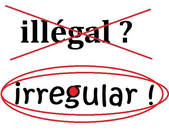Refugees: Myths and Facts #2
|

, Myth #2 Roxham Road Refugees are Illegal
The right to seek refuge from danger and persecution is a fundamental right protected under the Universal Declaration of Human Rights.[i] International law recognizes that in order to seek safety, refugees must sometime use false documents or slip across borders.
Although the word ‘illegal’ is used repeatedly in the media to describe people entering Canada at Roxham Road, it is not correct. Asylum seekers are not illegals and Canadian law confirms this. “There is nothing in the Immigration and Refugee Protection Act (IRPA) that makes crossing the border at an unofficial border area illegal. As long as refugee claimants immediately report to an immigration official they are complying with the law “.[ii] Under Article 31 of the 1951 Refugee Convention, Canada has a duty to allow people to enter to seek protection and cannot prosecute them for the way they arrive. [iii] Section 133 of IRPA confirms this obligation, stating that refugee claimants will not be prosecuted for their manner of entry into Canada.[iv]
That is why the Immigration and Refugee Board of Canada, the department of Immigration, Refugees and Citizenship Canada as well as the UN Refugee Agency use the term ‘irregular’ to describe their entry into Canada. Many of the people coming in at Roxham Road (and other sites) came into the US legally, but are now fleeing changes in their status there and are afraid of being sent back to their home country to face danger. Moreover, people crossing irregularly have a right to access fundamental justice here under the Canadian Charter of Rights and Freedoms, as the Supreme Court decided in the Singh decision of 1985.
[i] “Everyone has the right to seek and to enjoy in other countries asylum from persecution.”
Article 14, Universal Declaration of Human Rights
[ii] Correspondence with Immigration Lawyer in Toronto. You can read a briefing from the Canadian Association of Refugee Lawyers (CARL) explaining this in greater detail here: "Legal Backgrounder: refugee claimants are not 'Illegal'."
[iii] “The Contracting States shall not impose penalties, on account of their illegal entry or presence, on refugees who, coming directly from a territory where their life or freedom was threatened in the sense of article 1, enter or are present in their territory without authorization, provided they present themselves without delay to the authorities and show good cause for their illegal entry or presence.” Article 31(1), 1951 Convention Relating to the Status of Refugees, United Nations (Canada has ratified this Convention and the 1967 Protocol)
[iv] “Canada Border Services Agency, the RCMP and their domestic and international partners work together to intercept individuals who enter Canada illegally. No enforcement actions are taken against people seeking asylum as per section 133 of the Immigration and Refugee Protection Act (2001).”
https://www.canada.ca/en/immigration-refugees-citizenship/services/refugees/asylum-claims.html
The right to seek refuge from danger and persecution is a fundamental right protected under the Universal Declaration of Human Rights.[i] International law recognizes that in order to seek safety, refugees must sometime use false documents or slip across borders.
Although the word ‘illegal’ is used repeatedly in the media to describe people entering Canada at Roxham Road, it is not correct. Asylum seekers are not illegals and Canadian law confirms this. “There is nothing in the Immigration and Refugee Protection Act (IRPA) that makes crossing the border at an unofficial border area illegal. As long as refugee claimants immediately report to an immigration official they are complying with the law “.[ii] Under Article 31 of the 1951 Refugee Convention, Canada has a duty to allow people to enter to seek protection and cannot prosecute them for the way they arrive. [iii] Section 133 of IRPA confirms this obligation, stating that refugee claimants will not be prosecuted for their manner of entry into Canada.[iv]
That is why the Immigration and Refugee Board of Canada, the department of Immigration, Refugees and Citizenship Canada as well as the UN Refugee Agency use the term ‘irregular’ to describe their entry into Canada. Many of the people coming in at Roxham Road (and other sites) came into the US legally, but are now fleeing changes in their status there and are afraid of being sent back to their home country to face danger. Moreover, people crossing irregularly have a right to access fundamental justice here under the Canadian Charter of Rights and Freedoms, as the Supreme Court decided in the Singh decision of 1985.
[i] “Everyone has the right to seek and to enjoy in other countries asylum from persecution.”
Article 14, Universal Declaration of Human Rights
[ii] Correspondence with Immigration Lawyer in Toronto. You can read a briefing from the Canadian Association of Refugee Lawyers (CARL) explaining this in greater detail here: "Legal Backgrounder: refugee claimants are not 'Illegal'."
[iii] “The Contracting States shall not impose penalties, on account of their illegal entry or presence, on refugees who, coming directly from a territory where their life or freedom was threatened in the sense of article 1, enter or are present in their territory without authorization, provided they present themselves without delay to the authorities and show good cause for their illegal entry or presence.” Article 31(1), 1951 Convention Relating to the Status of Refugees, United Nations (Canada has ratified this Convention and the 1967 Protocol)
[iv] “Canada Border Services Agency, the RCMP and their domestic and international partners work together to intercept individuals who enter Canada illegally. No enforcement actions are taken against people seeking asylum as per section 133 of the Immigration and Refugee Protection Act (2001).”
https://www.canada.ca/en/immigration-refugees-citizenship/services/refugees/asylum-claims.html